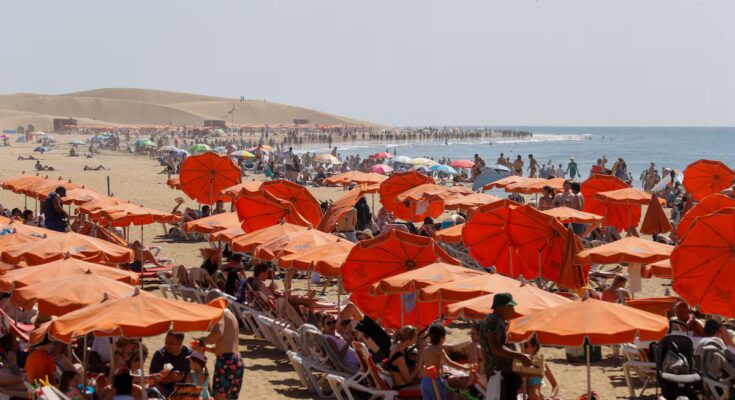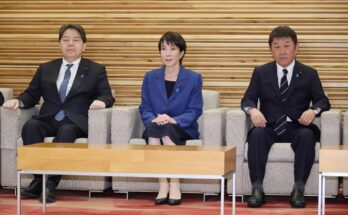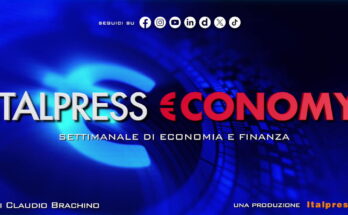The arrival of international tourists continues unstoppable in the Canary Islands: 11.6 million until September, 4.6% more than a year ago and 70% more than in 2010. The GDP generated by this activity has grown even more, by 87% in the last 15 years. The engine runs at full speed, but for whom? The unemployment rate remains at 13.3% (the third highest in Spain), salaries are in second to last place (1,872 euros of wage costs in the first quarter, according to the National Institute of Statistics) and the risk of poverty or social exclusion affects more than 30% of the population, above the Spanish average. According to the latest report Sustainability of tourism in the Canary Islandsrecently published by the autonomous government of the archipelago, only 46% of the inhabitants believe that tourism improves the quality of life, a perception that has been seen in city demonstrations calling for a change in the tourism model.
“Why, with so much tourism, doesn’t the money take root here?” Pablo Hernández, president of the Special Zone of the Canary Islands, a public body under the Ministry of Finance responsible for the diversification of the economy, recently asked a question about Cadena SER. He himself indicates a possible answer: calls losses of the economy, the part of the added value generated that goes abroad. “A leaking pool can be repaired by injecting more water, i.e. attracting more tourists, but also by covering the cracks,” he explained graphically.
The director of the University Institute for Tourism and Sustainable Development of the University of Las Palmas de Gran Canaria, Sergio Moreno, agrees. “Leaks are a fact,” he says in a telephone conversation, while calling for a detailed macroeconomic study of the sector and a decision-making process to limit its effects. Moreno divides leaks between those resulting from imports and those resulting from exports. “The former are inevitable,” he says: the Canary Islands don’t have a powerful industry, so they need to import goods from outside, from food to cars. “However, we need to think about what products we can grow, for example, for breakfasts served in hotels. There should be fiscal aid to be able to increase production in these areas or, perhaps, modify the Canary Islands Economic and Fiscal Regime (REF),” he explains.
The export side is, perhaps, more visible. The benefits of foreign investments are attributed here. Not only should money be taken into account when purchasing or opening hotels, but accommodation costs (whether intended for holidays or not) should also be considered. This context also includes the low qualification of staff, which means that it is necessary to resort to external labor who then repatriates the profits. In turn, this includes the intermediation role of actors such as tour operators and, obviously, that of the platform economy, which impose commissions of up to 20%. «Booking or Airbnb, to name two, are much more harmful than tour operators, given that they are much less involved in the territories: for them a destination is as interchangeable as a t-shirt», says Moreno.
A study by the University of La Laguna, sponsored by Ashotel, the hotel association of the province of Santa Cruz de Tenerife, explains it clearly: “A very significant part of the tourist expenditure for visits to the Canary Islands is destined for the companies of origin. Around 30% of the tourist expenditure is carried out in the archipelago, while the expenditure at the origin is around 70%”. “This is linked to the importance of tourist packages and, in particular, all-inclusive offers. All-inclusive offers represented 30% of tourist arrivals to the Canary Islands in 2018, while packages were the form chosen by 59% of tourists who visited the islands. This type of tourism model, together with the weakness of local entrepreneurship and innovation systems, does not encourage economic impacts on the archipelago,” adds the report.
What is the impact?
It is difficult to determine the exact percentage that was leaked. According to a UN study carried out in 2010, the average loss for most developing countries is between 40% and 50% – these losses are claimed to be as high as 80% in the Caribbean – and between 10% and 20% for developed countries. The Minister of Tourism, Jessica de León (Popular Party), had assured at the beginning of the year that 30% of what travelers spend does not stay on the islands. Pablo Hernández himself had estimated shortly before, in a speech to the Parliament of the Canary Islands, that these losses are between 10% and 50%. After the summer, De León toned down this leak in a parliamentary response to a range “between 7% and 10%,” citing reports “from business confederations and chambers of commerce.” Canary Islands government sources refused to comment on the matter and limited themselves to highlighting the role of tourism in the Canary Islands’ economy. Spokespeople for business organizations, for their part, question these calculations, stating that transportation costs alone already represent at least 20% of filtration.
Moreno underlines the need to make greater use of local experience in the sector: “The islands are not on the periphery of this sector, they are a capital player”. He cites, for example, Canarias Living Lab, an EU-funded project involving the central and Canarian governments, which aims to apply artificial intelligence in tourism through hyper-personalised travel, experiential itineraries or the creation of complete digital twins (a software simulate, predict and optimize its real-world equivalent) for managing infrastructure, spaces or crowds.
There are, in turn, companies that seek to reduce intermediation and dependence on the Canary Islands tourism sector. ThinkIN, for example, is a company created in Tenerife that aims to increase direct hotel sales. “This is still the most profitable in every sense: not only economically, but also because it gives you the freedom to manage the rooms or prices as you wish, and to stop depending too much on the tour operator or OTAs (online travel agencies) like Booking or Expedia and get rid of your blackmail“, explains Alejandro Martín, founder and CEO of the company, in a video conference. “Less intermediation means more income, and this benefits the company,” he says.



